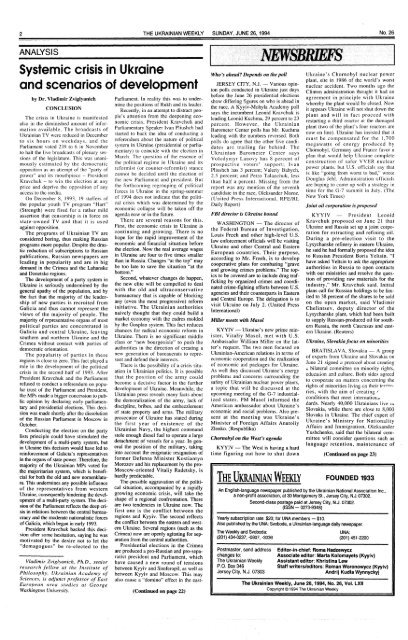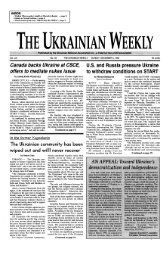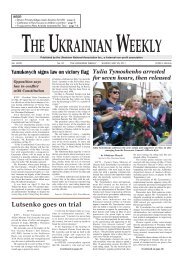The Ukrainian Weekly 1994
The Ukrainian Weekly 1994
The Ukrainian Weekly 1994
You also want an ePaper? Increase the reach of your titles
YUMPU automatically turns print PDFs into web optimized ePapers that Google loves.
2 THE UKRAINIAN WEEKLY SUNDAY, JUNE 26,<strong>1994</strong> No. 26<br />
ANALYSIS^^^^^^^^<br />
Systemic crisis in Ukraine<br />
and scenarios of development<br />
by Dr. viadimir Zviglyanich<br />
CONCLUSION<br />
<strong>The</strong> crisis in Ukraine is manifested<br />
also in the diminished amount of infor–<br />
mation available. <strong>The</strong> broadcasts of<br />
<strong>Ukrainian</strong> ТУ were reduced in December<br />
to six hours on weekdays, and the<br />
Parliament voted 239 to 6 in November<br />
to halt the live broadcasts of plenary ses–<br />
sions of the legislature. This was unani–<br />
mously estimated by the democratic<br />
opposition as an attempt of the "party of<br />
power" and its mouthpiece - President<br />
Kravchuk - to win the election at any<br />
price and deprive the opposition of any<br />
access to the media.<br />
On December 8, 1993, 19 staffers of<br />
the popular youth ТУ program "Hart"<br />
(Strength) were fired for a rather mild<br />
assertion that censorship is in force on<br />
state-owned ТУ and that it is used<br />
against opposition.<br />
<strong>The</strong> programs of <strong>Ukrainian</strong> ТУ are<br />
considered boring, thus making Russian<br />
programs more popular. Despite the dras–<br />
tic reduction of subscriptions to Russian<br />
publications, Russian newspapers are<br />
leading in popularity and are in big<br />
demand in the Crimea and the Luhanske<br />
and Donetske regions.<br />
<strong>The</strong> development of a party system in<br />
Ukraine is seriously undermined by the<br />
general apathy of the population, and by<br />
the fact that the majority of the leadership<br />
of new parties is recruited from<br />
Galicia and thus cannot represent the<br />
views of the majority of people. <strong>The</strong><br />
majority of representative organs of most<br />
political parties are concentrated in<br />
Galicia and central Ukraine, leaving<br />
southern and northern Ukraine and the<br />
Crimea without contact with parties of<br />
democratic orientation.<br />
<strong>The</strong> popularity of parties in these<br />
regions is close to zero. This fact played a<br />
role in the development of the political<br />
crisis in the second half of 1993. After<br />
President Kravchuk and the Parliament<br />
refused to conduct a referendum on popu–<br />
lar trust of the Parliament and President,<br />
the MPs made a bigger concession to publie<br />
opinion by declaring early parliamen–<br />
tary and presidential elections. This deci–<br />
sion was made shortly after the dissolution<br />
of the Russian Parliament in Moscow in<br />
October.<br />
Conducting the election on the party<br />
lists principle could have stimulated the<br />
development of a multi-party system, but<br />
in Ukraine this decision would have led to<br />
reinforcement of Galicia's representatives<br />
in the organs of state power. <strong>The</strong>refore, the<br />
majority of the <strong>Ukrainian</strong> MPs voted for<br />
the majoritarian system, which is benefi–<br />
cial for both the old and new nomenklatu–<br />
ra. This undermines any possible influence<br />
of the representatives from western<br />
Ukraine, consequently hindering the devel–<br />
opment of a multi-party system. <strong>The</strong> deci–<br />
sion of the Parliament reflects the deep cri–<br />
sis in relations between the central bureau–<br />
cracy and the moderate nationalistic forces<br />
of Galicia, which began in early 1993.<br />
President Kravchuk backed this deci–<br />
sion after some hesitation, saying he was<br />
motivated by the desire not to let the<br />
"demagogues" be re-elected to the<br />
viadimir Zviglyanich, Ph.D., senior<br />
research fellow at the institute of<br />
Philosophy, <strong>Ukrainian</strong> Academy of<br />
Sciences, is adjunct professor of East<br />
European area studies at George<br />
Washington University.<br />
Parliament, in reality this was to under–<br />
mine the positions of Rukh and its leader.<br />
Recently, in an attempt to distract peo–<br />
ple's attention from the deepening eco–<br />
nomic crisis, President Kravchuk and<br />
Parliamentary Speaker ivan Pliushch had<br />
started to back the idea of conducting a<br />
referendum about the nature of political<br />
system in Ukraine (presidential or parlia–<br />
mentary) to coincide with the election in<br />
March. <strong>The</strong> question of the essence of<br />
the political regime in Ukraine and its<br />
reformist (or counter-reformist) stance<br />
cannot be decided until the election of<br />
the new Parliament and president. But<br />
the forthcoming regrouping of political<br />
forces in Ukraine in the spring-summer<br />
of <strong>1994</strong> does not indicate that the politi–<br />
cal crisis which was determined by the<br />
economic collapse will be taken off the<br />
agenda now or in the future.<br />
<strong>The</strong>re are several reasons for this.<br />
First, the economic crisis in Ukraine is<br />
continuing and growing. <strong>The</strong>re is no<br />
hope for the rapid improvement of the<br />
economic and financial situation before<br />
the election. Now the real average wages<br />
in Ukraine are four to five times smaller<br />
than in Russia. Changes "at the top" may<br />
be too late to save the situation "at the<br />
bottom."<br />
Second, whatever changes do happen,<br />
the hew elite will be compelled to deal<br />
with the old and ultraconservative<br />
bureaucracy that is capable of blocking<br />
any (even the most progressive) reform<br />
initiative. <strong>The</strong> <strong>Ukrainian</strong> authorities<br />
naively thought that they could build a<br />
market economy with the cadres molded<br />
by the Gosplan system. This fact reduces<br />
chances for radical economic reform in<br />
Ukraine. <strong>The</strong>re is no significant middle<br />
class or "new bourgeoisie" to push the<br />
authorities in the direction of creating a<br />
new generation of bureaucrats to repre–<br />
sent and defend their interests.<br />
<strong>The</strong>re is the possibility of a crisis situ–<br />
ation in <strong>Ukrainian</strong> politics, it is possible<br />
that the position of the army could<br />
become a decisive factor in the further<br />
development of Ukraine. Meanwhile, the<br />
<strong>Ukrainian</strong> press reveals many facts about<br />
the demoralization of the army, lack of<br />
discipline, bribes, and the embezzlement<br />
of state property and arms. <strong>The</strong> military<br />
prosecutor of Ukraine has stated during<br />
the first year of existence of the<br />
<strong>Ukrainian</strong> Navy, the highest command<br />
stole enough diesel fuel to operate a large<br />
detachment of vessels for a year, in gen–<br />
eral the position of the military, taking<br />
into account the enigmatic resignation of<br />
former Defense Minister Kostiantyn<br />
Morozov and his replacement by the pro-<br />
Moscow-oriented Укаїіу Radetsky, is<br />
hardly predictable.<br />
<strong>The</strong> possible aggravation of the politi–<br />
cal situation, accompanied by a rapidly<br />
growing economic crisis, will take the<br />
shape of a regional confrontation. <strong>The</strong>re<br />
are two tendencies in Ukraine now. <strong>The</strong><br />
first one is the conflict between the<br />
regions and Kyyiv. <strong>The</strong> second reflects<br />
the conflict between the eastern and west–<br />
ern Ukraine. Several regions (such as the<br />
Crimea) now are openly agitating for sep–<br />
aration from the central authorities.<br />
Presidential elections in the Crimea<br />
are produced a pro-Russian and pro-sepa–<br />
ratist president and Parliament, which<br />
have caused a new round of tensions<br />
between Kyyiv and Simferopil, as well as<br />
between Kyyiv and Moscow. This may<br />
also cause a "domino" effect in the eastcontinued<br />
on page 22)<br />
Who's ahead Depends on the poll Ukraine's Chornobyl nuclear power<br />
plant, site in 1986 of the world's worst<br />
JERSEY C1TY, N.J. - various opin– nuclear accident. Two months ago the<br />
ion polls conducted in Ukraine just days Clinton administration thought it had an<br />
before the June 26 presidential elections agreement in principle with Ukraine<br />
show differing figures on who is ahead in<br />
whereby the plant would be closed. Now<br />
the race. A Kyyiv-Mohyla Academy poll<br />
it appears Ukraine will not shut down the<br />
says the incumbent Leonid Kravchuk is<br />
plant and will in fact proceed with<br />
leading Leonid Kuchma, 29 percent to 23<br />
restarting a third reactor at the damaged<br />
percent. However, the <strong>Ukrainian</strong><br />
plant (two of the plant's four reactors are<br />
Barometer Center polls has Mr. Kuchma<br />
now on line). Ukraine has insisted that it<br />
leading with the numbers reversed. Both<br />
must be compensated for the 1,700<br />
polls do agree that the other five candi–<br />
megawatts of energy produced by<br />
dates are trailing far behind. <strong>The</strong><br />
Chornobyl. Germany and France favor a<br />
<strong>Ukrainian</strong> Barometer Center says<br />
plan that would help Ukraine complete<br />
yolodymyr Lanovy has 8 percent of<br />
construction of safer WER nuclear<br />
prospective voters' support; ivan<br />
power plants, but U.S. officials say that<br />
Pliushch has 3 percent; Уаіегіу Babych,<br />
is like "going from worst to bad," wrote<br />
2.5 percent; and Petro Talanchuk, less<br />
Douglas Jehl. Administration officials<br />
than half a percent. Missing from the<br />
are hoping to come up with a strategy in<br />
report was any mention of the seventh<br />
time for the G-7 summit in July. (<strong>The</strong><br />
candidate in the race, Oleksander Moroz.<br />
New York Times)<br />
(United Press international, RFE7RL<br />
Daily Report)<br />
Joint oil corporation is proposed<br />
FB1 director is Ukraine bound<br />
WASHINGTON - <strong>The</strong> director of<br />
the Federal Bureau of investigation,<br />
Louis Freeh and other high-level U.S.<br />
law enforcement officials will be visiting<br />
Ukraine and other Central and Eastern<br />
European countries. <strong>The</strong>ir purpose,<br />
according to Mr. Freeh, is to develop<br />
cooperative plans for combating "grave<br />
and growing crimes problems." <strong>The</strong> top–<br />
ics to be covered are to include drug traf–<br />
ficking by organized crimes and coordi–<br />
nated crime-fighting efforts between U.S.<br />
agencies and their counterparts in Eastern<br />
and Central Europe. <strong>The</strong> delegation is to<br />
visit Ukraine on July 2. (United Press<br />
international)<br />
Miller meets with Masol<br />
KYYiy — Ukraine's new prime min–<br />
ister, yitaliy Masol, met with U.S.<br />
Ambassador William Miller on the lat–<br />
ter's request. <strong>The</strong> two men focused on<br />
<strong>Ukrainian</strong>-American relations in terms of<br />
economic cooperation and the realization<br />
of economic aid packages for Ukraine.<br />
As well they discussed Ukraine's energy<br />
problems and concerns surrounding the<br />
safety of <strong>Ukrainian</strong> nuclear power plants,<br />
a topic that will be discussed at the<br />
upcoming meeting of the G-7 industrial -<br />
ized states. PM Masol informed the<br />
American ambassador about Ukraine's<br />
economic and social problems. Also pre–<br />
sent at the meeting was Ukraine's<br />
Minister of Foreign Affairs Anatoliy<br />
Zlenko. (Respublika)<br />
Chornobyl on the West's agenda<br />
KYYiy - <strong>The</strong> West is having a hard<br />
time figuring out how to shut down<br />
THE UKRAINIAN WEEKLY<br />
KYYiy - President Leonid<br />
Kravchuk proposed on June 21 that<br />
Ukraine and Russia set up a joint corpo–<br />
ration for extracting and refining oil.<br />
During a pre-election visit to the<br />
Lysychanske refinery in eastern Ukraine,<br />
he said he had formally proposed the idea<br />
to Russian President Boris Yeltsin. "1<br />
have asked Yeltsin to ask the appropriate<br />
authorities in Russia to open contacts<br />
with our ministries and resolve the ques–<br />
tion of providing raw materials for the<br />
industry," Mr. Kravchuk said, initial<br />
plans call for Russian holdings to be lim–<br />
ited to 38 percent of the shares to be sold<br />
on the open market, said yiadimir<br />
Chelintsev, deputy director of the<br />
Lysychanske plant, which had been built<br />
to supply Russian-produced oil for south–<br />
ern Russia, the north Caucasus and east–<br />
ern Ukraine. (Reuters)<br />
Ukraine, Slovakia focus on minorities<br />
BRATISLAVA, Slovakia - A group<br />
of experts from Ukraine and Slovakia on<br />
June 21 signed a protocol about creating<br />
a bilateral committee on minority rights,<br />
education and culture. Both sides agreed<br />
to cooperate on matters concerning the<br />
rights of minorities living on their terntn–<br />
ries, with the aim of creating r<br />
conditions that meet internationu<br />
dards. Nearly 40,000 <strong>Ukrainian</strong>s live m<br />
Slovakia, while there are close to 8,000<br />
Slovaks in Ukraine. <strong>The</strong> chief expert of<br />
Ukraine's Ministry for Nationality<br />
Affairs and immigration, Oleksander<br />
Yushchenko, said that the bilateral com–<br />
mittee will consider questions such as<br />
language retention, maintenance of<br />
(Continued on page 23)<br />
FOUNDED ШЗ<br />
An English-language newspaper published by the <strong>Ukrainian</strong> National Association inc.,<br />
a non-profit association, at 30 Montgomery St., Jersey City, N.J. 07302.<br />
Second-class postage paid at Jersey City, N.J. 07302.<br />
(1SSN - 0273-9348)<br />
Yearly subscription rate: $2Q^ for UNA members - S10.<br />
Also published by the UNA: Svoboda, a <strong>Ukrainian</strong>-language daily newspaper.<br />
<strong>The</strong> <strong>Weekly</strong> and Svoboda:<br />
UNA:<br />
(201) 434-0237, -0807, -3036 (201) 451 -2200<br />
Postmaster, send address<br />
changes to:<br />
<strong>The</strong> <strong>Ukrainian</strong> <strong>Weekly</strong><br />
P.O. Box 346<br />
Jersey City, N.J. 07303<br />
Editor-in-chief: Roma Hadzewycz<br />
Associate editor: Marta Kolomayets (Kyyiv)<br />
Assistant editor: Khristina Lew<br />
Staff writersfeditors: Roman Woronowycz (Kyyiv)<br />
Andrij Kudla Wynnyckyj<br />
<strong>The</strong> <strong>Ukrainian</strong> <strong>Weekly</strong>, June 26,<strong>1994</strong>, No. 26, vol. LXll<br />
Copyright (g) <strong>1994</strong> <strong>The</strong> <strong>Ukrainian</strong> <strong>Weekly</strong>

















